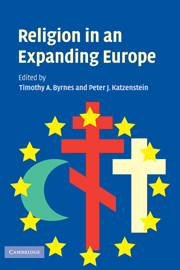Book contents
- Frontmatter
- Contents
- List of contributors
- Preface
- 1 Multiple modernities as limits to secular Europeanization?
- Part I European settings
- Part II Catholicism
- Part III Orthodoxy
- Part IV Islam
- Part V Conclusion
- 10 Religion, European identity, and political contention in historical perspective
- 11 Transnational religion and Europeanization
- References
- Index
10 - Religion, European identity, and political contention in historical perspective
Published online by Cambridge University Press: 22 September 2009
- Frontmatter
- Contents
- List of contributors
- Preface
- 1 Multiple modernities as limits to secular Europeanization?
- Part I European settings
- Part II Catholicism
- Part III Orthodoxy
- Part IV Islam
- Part V Conclusion
- 10 Religion, European identity, and political contention in historical perspective
- 11 Transnational religion and Europeanization
- References
- Index
Summary
Religion is once again becoming a central source of contention in European politics. As the contributors to this volume note, European political and cultural integration is now expanding to include political communities that did not experience the same process of secularization that took hold in Western and Central Europe during the second half of the twentieth century. At the same time, growing transnational linkages between Europe and other regions, primarily the Islamic world, are profoundly influencing European politics. Both of these developments are making religious identity an increasingly powerful locus for political mobilization and claims-making in European politics.
My aim in this chapter is to place these trends in historical perspective. In some respects, they are not particularly surprising. Significant aspects of European identity are tied to a long history involving the consolidation of Latin Christendom as a political-religious community. We must always be careful about the dangers of naïve cultural essentialism, yet it is difficult to imagine that Europeanization and increasing transnationalism would not generate political tensions involving religion. Many of the moments and processes that constitute important markers of European identity invoke a history built on the exclusion of religious heterogeneity, or on the management of intra-Latin Christian religious disputes.
In fact, one of the most important moments in the creation of the contemporary European religious-political order was the Westphalian settlement of 1648.
- Type
- Chapter
- Information
- Religion in an Expanding Europe , pp. 256 - 282Publisher: Cambridge University PressPrint publication year: 2006
- 5
- Cited by



